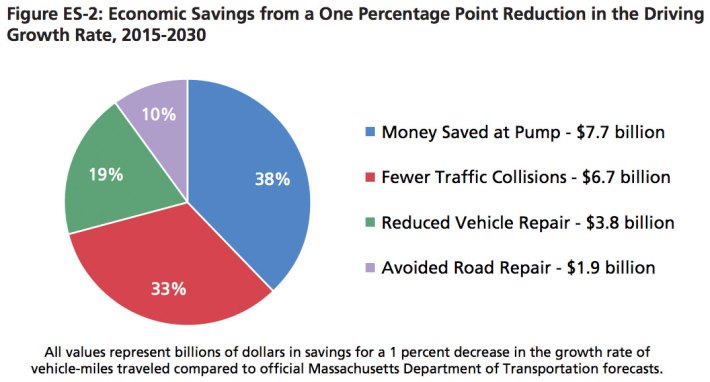What if, instead of basing policy around the presumption that people will drive more every year, transportation agencies started making decisions to reduce the volume of driving? And what if they succeed?
A new report from the Massachusetts Public Interest Research Group quantifies what would happen in that state if driving rates come in one percentage point lower than the state DOT's current annual projections. For instance, in a year that the DOT forecasts 0.49 percent growth in driving, MassPIRG hypothesizes a 0.51 percent decrease. MassPIRG estimates that the statewide effect from now until 2030 would add up to about $20 billion in savings and 23 million metric tons of carbon emissions avoided.
The effects grow as the decline compounds over time. In the first year, a one percentage point change in driving rates would save about $167 million in avoided costs of gas, road repairs, and traffic collisions. By 2030, the savings would rise to $2.3 billion per year.
Broken down by category, the state would save about $1.9 billion on road repairs over the 15-year period. Drivers would net $3.8 billion in savings on car repairs and another $7.7 billion on gas purchases. And auto collisions would cost $6.7 billion less to society, as people avoid medical expenses, property damage, and lost wages.
The environmental benefits would be significant, with a reduction in carbon emissions rising from 226.3 thousand metric tons in 2015 to 2.4 million in 2030.
While Massachusetts has set a goal to triple the amount of miles traveled by transit, biking, and walking by 2030, the state will need more aggressive policies to achieve the kind of mileage reductions outlined in the report, MassPIRG says. The organization recommends that the state adjust its criteria for deciding which transportation projects to build to more strongly emphasize public health, the environment, and social equity.
"Even a slight decrease in our driving can make a significant impact on our environment, our budget and our public health," MassPIRG's John C. Olivieri told Streetsblog. "We call on our state leaders to prioritize road repair over expansion and incorporate VMT into project selection."






